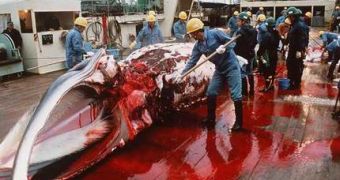If you're from Europe or North America, it would be simply unthinkable for you to eat whale meat.
But in Japan, it is just another usual custom. Whale meat may not be found everywhere - as tuna or tofu are - but in every city you may find at least one restaurant which serves it.
It is really interesting the abundance of whale meat delivered by a program aimed for the scientific research, as Japan, in fact defines its annual whale hunt.
In most Europe and North America, whales have become the iconic symbol of nature protection, not to be killed or hurt. Japan instead is a nation which gets a huge proportion of its food from the sea. In the Japanese view, whales are a just another wild natural resource, a sea food just like the fish or the lobsters. Or just a game. That's why whale conservation is difficult to be implemented here, even if they know that most whales are endangered.
Indeed, it was not exactly Japan the nation which drove some species towards extinction but rather the Americans and the Europeans, especially the Brits and Norwegians. But the Japanese can still be blamed for having brought to extinction some marine species from their waters, some even before the contact with the Europeans, like the Steller's sea cow.
And by now means does anything justify the task of the Japanese to finish off the planet's last whales. In fact, it was a conjuncture: had they had the Japanese the European advanced technique earlier in their history, should they have been involved in the early whale massacre?
Another issue is the harpooning.
The harpoons have an explosive charge into their tips, which detonates inside the whale. "Usually the first harpoon did not kill the animal - that would need a second firing, perhaps a third.", explained Akira Okiyoshi, a harpooner who spent 30 seasons hunting in Antarctic waters.
A noble way of dying for one of the most intelligent creatures of the planet.
What's the difference between this and halal abattoirs where cows are killed by draining out their blood, or fish impaled on steel hooks in the open ocean, or deer caught in snares waiting only for the relief of a huntsman's bullet.
It's interesting how the Japanese officials see the issue.
At a 2006 meeting the International Whaling Commission, Australia's environment minister cast the Japanese delegation as ignorant slaughterers. The Japanese delegate replied with Australia's annual "slaughter" of two million kangaroos.
That's a big difference: kangaroos are by no means threatened, but boosted by human activities in Australia (like water holes, made for livestock).
This comparison is like pointing towards the slaughter of the domestic pigs for the supermarkets.
It's worrying that young, modern urban Japanese tuck into whale meat, looking at it as something cultural. The problem is not the cultural issue per se: Chinese and Vietnamese eat dogs, French and Italians eat horse, and Finns proudly serve reindeer, but these species are NOT endangered.
In fact, they are grown by people.

 14 DAY TRIAL //
14 DAY TRIAL //